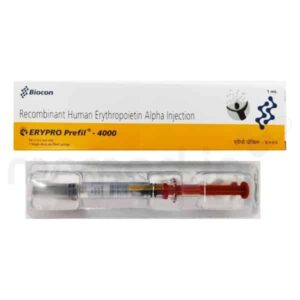RECOMBINANT HUMAN ERYTHROPOIET
RECOMBINANT HUMAN ERYTHROPOIET: Recombinant Human Erythropoietin, also known as Epoetin alfa, is a drug used to treat anemia caused by chronic kidney disease, cancer chemotherapy, or zidovudine treatment in patients with HIV infection. It is also used to reduce the need for blood transfusions in certain surgical patients.
The mechanism of action of Recombinant Human Erythropoietin involves stimulating the production of red blood cells in the bone marrow. It does this by binding to and activating erythropoietin receptors on red blood cell precursors, which then promotes their maturation into fully functional red blood cells. This increase in red blood cell production helps to alleviate anemia symptoms such as fatigue, weakness, and shortness of breath.
The dose of Recombinant Human Erythropoietin may vary depending on the individual patient’s specific condition, including the severity of anemia and the underlying cause. The drug is typically administered either as a subcutaneous injection or intravenous infusion. It is important to follow the prescribed dosage instructions provided by a healthcare professional.
As with any medication, Recombinant Human Erythropoietin is associated with potential side effects. Common side effects may include headache, injection site reactions (such as pain, redness, or swelling), flu-like symptoms (such as fever or chills), nausea, vomiting, diarrhea, and high blood pressure. In rare cases, more serious side effects may occur, including blood clots, seizures, allergic reactions, and worsening anemia. It is important to consult a healthcare provider if any concerning or severe side effects are experienced while taking this medication.


